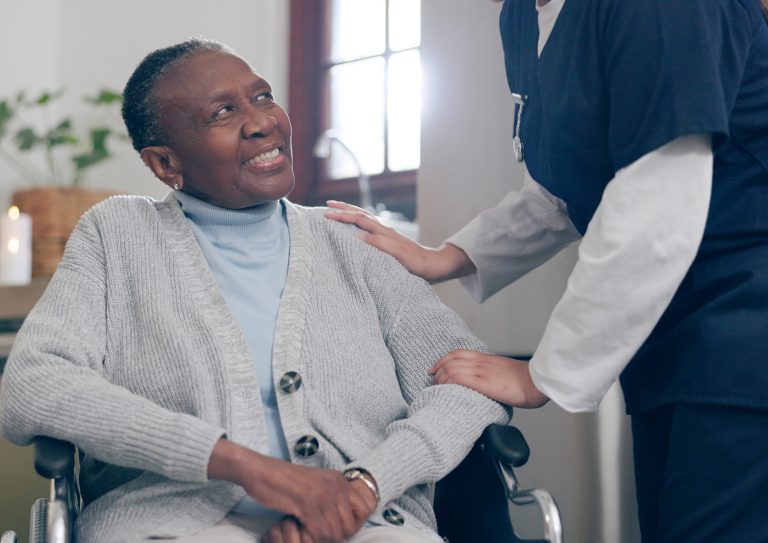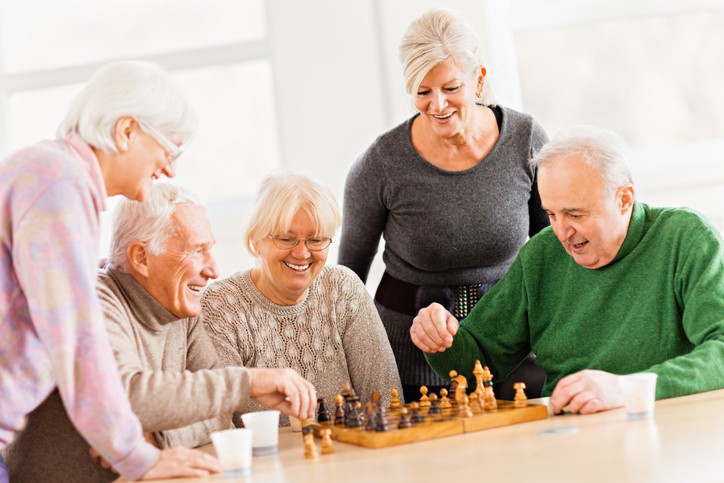
When your loved one transitions into an assisted living community, the role of caregivers becomes one of the most important aspects of their day-to-day life. Understanding what an assisted living caregiver does and how they contribute to your loved one’s care can make the process smoother for you and your family and provide peace of mind.
We want to provide families with a clear understanding of the responsibilities, qualifications, and qualities to look for in assisted living caregivers.
Whether you’re just beginning to explore options or are trying to ensure your loved one is in good hands, we want you to feel confident in your decisions.
The Role of Caregivers in Assisted Living Communities
At the heart of every assisted living community are the caregivers. These professionals offer a wide range of services to support elderly residents in maintaining their independence while ensuring they receive the necessary care. Their work goes far beyond the tasks of assisting with daily activities; it’s about providing a safe, supportive environment where residents can thrive.
Caregivers in assisted living communities are responsible for helping residents with personal care, offering medical support, and providing emotional companionship. But their role doesn’t stop there—they’re the ones who create a nurturing atmosphere that helps residents feel valued and understood. For families, this means having someone to rely on for the well-being of their loved ones, which can be both comforting and empowering.
What Are the Core Responsibilities of Assisted Living Caregivers?
Personal Care
One of the primary roles of assisted living caregivers is to help residents with personal care needs. This includes assisting with everyday activities like bathing, dressing, grooming, and eating. These tasks, which might seem simple to most, become more challenging for the elderly. Caregivers ensure that residents maintain their dignity and independence by helping them with these essentials while respecting their privacy.
Medical Care
Caregivers also play a crucial role in supporting residents’ medical needs. From medication administration to monitoring health conditions and coordinating care with doctors, caregivers act as the link between residents and their healthcare providers. While they aren’t nurses or doctors, their responsibility in ensuring medications are taken correctly and promptly can significantly impact the resident’s quality of life. Other important aspects of their role include keeping track of health issues and alerting medical professionals when necessary.
Emotional Support
Emotional well-being is just as important as physical health, and in assisted living communities, caregivers are often a key source of companionship for residents. They engage residents in social activities, provide a listening ear, and offer comfort during difficult times. These caregivers become trusted friends who provide emotional stability, helping residents feel connected and less isolated, which is crucial for their mental health.
Safety and Supervision
Keeping residents safe is a top priority in assisted living communities. Caregivers are responsible for monitoring residents to prevent falls or injuries, watching for signs of illness, and responding to emergencies as they arise. Their vigilance ensures that residents remain safe, whether through gentle supervision or immediate action when something goes wrong.
What Families Should Look for in Assisted Living Caregivers
Choosing the right assisted living community involves more than just the amenities or the location. Families must pay close attention to the caregivers as they interact with their loved ones daily. Here are several key factors to consider:
Qualifications and Training
Senior care requires specific skills, so it’s essential to look for caregivers who have proper certifications and training. This includes certifications in elderly care, first aid, and specialized training in areas such as dementia care or Alzheimer’s care. The best communities prioritize ongoing education for their staff, ensuring they stay updated on best practices in elder care.
Compassion and Patience
While qualifications are critical, so are personal qualities like empathy and patience. Caregivers need to approach their work with kindness, understanding that the elderly can often struggle with limitations. Look for caregivers who show genuine concern for the residents and treat them respectfully. A caring attitude can make all the difference in the quality of life for your loved one.
Communication Skills
Effective communication is essential when providing senior care. In assisted living communities, caregivers should be able to communicate clearly with both residents and their families. Whether it’s giving updates on a resident’s health or responding to concerns, caregivers must know how to listen attentively and speak in a way that fosters trust.
Staff-to-Resident Ratio
One important factor in determining the level of care your loved one will receive is the staff-to-resident ratio. Communities with a higher number of staff members compared to residents can offer more personalized attention. This ensures that caregivers aren’t overwhelmed, and each resident gets the care and attention they need. A low ratio means caregivers have more time to assist, engage, and monitor each resident closely.
Assessing Caregiver Quality in Assisted Living Communities
Choosing an assisted living community isn’t easy. You want your loved one to receive the very best care and maintain their independence as long as possible. When visiting a senior living community, there are a few important things to observe and questions to ask to assess caregiver quality.
Key Questions Families Can Ask
Ask about the community’s staff turnover rate. A high turnover rate can indicate problems with staff morale or management, which could affect the consistency and quality of care your loved one receives. Also, inquire about staff training programs and how often caregivers receive ongoing education.
It’s also worth asking how the community handles personalized care plans. Are care plans regularly updated based on the resident’s changing needs? How involved are families in the planning process?
Observations During a Visit
When touring a community, note how the caregivers interact with the residents. Do they seem engaged, friendly, and patient? Observe their body language—do they appear calm and attentive or rushed and overwhelmed? The demeanor of caregivers can give you a good indication of the atmosphere at the community.
Additionally, observe the overall environment and culture. A community where caregivers seem happy and well-supported is more likely to provide high-quality care. Also, pay attention to how caregivers handle routine tasks. Do they offer help promptly and approach residents with a smile and patience?
The Importance of Family Involvement
You want to be involved in your loved one’s care, and great assisted living communities will encourage that. Look for a community that encourages open communication between an assisted living caregiver and your family. Regular updates, consultations, and even family meetings ensure that you stay informed and involved in your loved one’s care. Don’t hesitate to ask how the community facilitates these types of interactions.
Trust Our Assisted Living Caregivers for Your Loved One’s Well-Being
Finding the right assisted living caregivers for your loved one is a big decision. It requires careful consideration of qualifications, compassion, communication, and how the community manages the overall care experience. At FellowshipLIFE, we understand the weight of this choice, and we’re here to help you navigate it with confidence.
As a family member, we invite you to schedule a tour of our community, meet a dedicated assisted living caregiver, and see firsthand how we prioritize the well-being and happiness of our residents. You can also arrange a consultation to discuss your senior loved one’s needs and how we can create a personalized care plan.
For more information or to schedule a visit, please contact us today. Let us help you make sure your loved one is cared for with the utmost compassion and professionalism.




